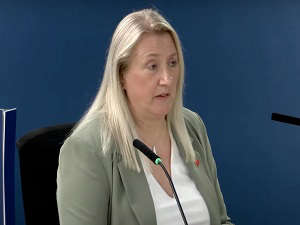
By Michael McHugh
Arlene Foster was left feeling "uplifted" after meeting Irish language pupils in Co Down.
The Democratic Unionist leader met staff and students at Our Lady's Grammar School in Newry in a bid to better understand the love of the tongue held by those from a non-political background.
She was strongly criticised for making disparaging comments during a recent Assembly election campaign but on Tuesday exchanged a few words as gaeilge with teachers in farewell.
"I was really uplifted this morning by the girls and what they were able to tell me and what they were able to show me."
Beautiful gift from Our Lady's Grammar School, Newry which I visited today. pic.twitter.com/vAU7nkWTCx
— Arlene Foster (@DUPleader) 26 April 2017
She said she enjoyed a lovely piece of drama and a song.
"It was wonderful, I just had a great morning. It has set me up for the rest of the day."
In February, Mrs Foster said more people spoke Polish than Irish in Northern Ireland and declared the party would never agree to an act protecting the language, a key Sinn Fein aim in negotiations to restore powersharing.
On Tuesday she clarified: "It had become very much a political demand and as we talked about Irish, its culture and affirmation of identity in the talks, I felt that it would be good to step back from the Irish language as a political demand and to actually listen to people who loved the language and wanted to use it in their every day lives.
"That is what I am trying to do.
"I am on a journey of doing that. I have met with some individuals already around why they believe Irish is so important to them."
Sinn Fein surged at the polls in the March Assembly elections after the party accused the DUP of showing disrespect towards the language.
Mrs Foster's comparison of making concessions to Sinn Fein to feeding crocodiles backfired and she has said she regretted it and it allowed her opponents to demonise her.
An Irish language act would protect its use in a range of official settings.
In 2015, Sinn Fein launched a consultation on a law including the use of Irish by public bodies, in the courts, and in the Stormont assembly.
Unionists have urged measures for Ulster Scots speakers and progress on other identity issues.
Mrs Foster said Tuesday's meeting was instructive; that it was a sign of strength to engage with a culture which was not her own.
"One of the very strong things that came across was the passion that the girls had for the language and it is really good to strip away all the politics out of this issue and just to listen in a very clear way as to how Irish and the language has helped in the study of other languages and to give them a head start in relation to job opportunities as well."
She said everyone had different views about what was needed to protect it.
On Thursday she is due to meet some other advocacy and support groups.


 Rescue operation to free 40 cows after lorry overturns on motorway
Rescue operation to free 40 cows after lorry overturns on motorway
 New date set for trial of former DUP leader Jeffrey Donaldson and wife
New date set for trial of former DUP leader Jeffrey Donaldson and wife
 Shared education campus ‘symbolic’ in Northern Ireland’s reconciliation journey
Shared education campus ‘symbolic’ in Northern Ireland’s reconciliation journey
 Man jailed for seven years after crash which killed two teenagers
Man jailed for seven years after crash which killed two teenagers
 Couple died after Covid ‘taken into house by carers’, daughter tells inquiry
Couple died after Covid ‘taken into house by carers’, daughter tells inquiry